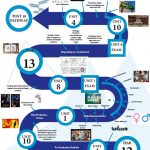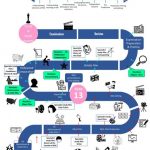Media & Film Studies
Intent
We aim to create media and cine literate students who can both actively read and decode written and visual texts allowing them to make independent, informed decisions regardless of source material, situation or technology in a fast paced and ever-changing digital world.
The Media curriculum focuses on ensuring students are prepared for the world of work and further education/continued study by teaching them the skills required, both practical and analytical, to ensure they can understand the requirements of project management, from the planning stage through to filming and editing a product for a client. The course aims to develop students’ understanding of research, legal and ethical issues, teamwork and communication skills and promotes creativity in responses throughout. These concepts are revisited through a range of modules during both Key Stage 4 and 5 to ensure the learning is embedded and skills are successfully developed and understanding deepened. The department’s aim is to encourage and support every student’s creativity, emboldening them to thrive in the digital world using the skills and knowledge gained so they have confidence to cope with life beyond the school environment.
The Film curriculum aims to broaden students’ understanding of cinema, both present day and historical, through a global approach to texts, alongside developing filmmakers of the future. The focus is on changing students’ perception of film viewing by encouraging them to become more actively engaged with a text, seeking to understand the factors behind the creation of meaning, from the use of micro elements to cultural and production considerations. The subject also encourages students’ own creativity through the opportunity to plan and produce their own film, giving them an insight into the required skills for the industry.
As a department we aim to provide a curriculum that meets the needs of all students including SEND students. The overall intention of both curricula is for students to be able to achieve their maximum irrespective of their initial level, by developing analytical, resourceful and proactive students who are prepared to constantly challenge their own way of looking at material or ideas when searching for answers or planning projects. As a department who are passionate about their subject we want to encourage and enthuse this passion in our students. By doing this we aim to develop students who are ready for the challenges of either further education or work-based environments.
Implementation
The Media and Film Schemes of work are specifically designed to allow engagement for students of all ability levels by working on foundation skills of micro analysis and core theory application for those that have not previously engaged with the subject before introducing more complex ideas once the foundation knowledge has been embedded. The interleaving design of the curriculum means topics are revisited through different modules/components, for example the BTEC Media KS5 Unit 8 Responding to a Commission exam revisits aspect of the previous Unit 4 Production Portfolio, being addressed in further detail, allowing students to both further enhance their prior knowledge whilst also learning new skills.
The course is taught by subject specialists and also has the support of dedicated technicians and as a result we are therefore able to quickly identify students whose practical or academic levels are not either GCSE or A-Level ready and are able to offer tailored support packages through clinics or 1-2-1 support. Where we have SEND students on the course we provide a tailored curriculum to support their needs and opportunities outside of the normal curriculum.
Our schemes of work have been updated and will continue to be updated throughout the year to ensure suitability, accessibility and engagement for all students. These are also amended on an ongoing basis in both Media and Film to ensure new practical techniques are covered to allow students to make maximum progress. The re-introduction of the on-site practical masterclasses in techniques will allow students to further their progress and develop industry ready skills.
During the completion of the topics the students undertake there is ongoing assessment with a summative piece completed at the end of each topic. The formative assessment allows a more tailored approach to lesson planning by identifying gaps in knowledge earlier and ensuring these are addressed to give the students more confidence in their summative piece.
Homework is generally designed and set using Google Classroom allowing online remote support to take place and allowing a wider range of audio-visual resources to be used to further support the task(s) set and enhance students’ understanding.
To develop the student’s cultural capital and enhance the passion and enjoyment of the subject we aim to provide them with opportunities to visit and experience real world working studios such as those at Media City in Salford or the Warner Brothers Studios in London. This will be further enhanced through the shared reading of articles from magazines such as Sight and Sound or Empire Film magazine, the end of year Creative Showcase of all students work, Virtual Talks on Google classroom from leaders within various Media/Film industries (Tik Tok/Spotify), Q&A sessions via zoom with actors/writers of films, a film reading book lending library and also a collage celebrating women in the Film industry in our corridor.
In such a practical industry the department is really keen to be able to offer live sessions and tutorials to help develop and inspire the younger generations passion and creativity for the subject through the reintroduction of our Photoshop and Into Film clubs for our Key Stage 3 students and our practical filmmaking masterclasses for our Key Stage 4 and 5 students. These extra-curricular activities will run alongside the regular support sessions on offer to both KS4 and KS5.
The continued promotion of external competitions such as those run by the British Film Institute provide students with an opportunity to produce high level projects, either individually or in collaboration with other students from the region, use cutting edge technology and network with industry specialists. Alongside this, the new Google Classroom sections on university courses and apprenticeships for all key stage 5 classes is designed to show students the vast range of opportunities available in both industries.
Impact
The overall impact of the department’s intent and how we implement that, will be seen with the continued excellent results throughout both key stages. There is an expectation that the department will continue to be ‘Red’ for ALP’s, both of which are currently grade 2 and that we continue with a positive SPI at KS4, which for the past two years has been above 1. A further impact will see the continued performance of disadvantaged students achieving above their expected grade.
With the combination of these factors and the continuation of outstanding teaching and learning there is an expectation that the department will continue to enable all students to achieve their maximum potential and therefore increase the number of students seeking places on our courses at both key stages. The department currently has 24 students taking KS5 BTEC Media and 15 students at KS5 Film Studies. As a direct consequence of this we should see more students undertaking university courses directly related to these subjects. In relation to those gaining a place on a university course or apprenticeship the expectation is that they will select a wider range of courses based on the new Google Classroom University/Apprenticeship section. Of the 14 Year 13 students who completed either an A-Level in Film Studies or a BTEC in Media in 2021/22, 86% of those have carried on to University. Throughout both curriculum the students develop skills of independence of thought and research, critical analysis, planning and structuring projects from initial ideas to completion, an awareness of legal and ethical issues surrounding the industry, as well as high level practical skills. This skills development has allowed the students to continue their education either by selecting a course directly related to their studies or by using their newly developed transferrable skills to adapt to a new subject such as:
- Film Studies at LJMU
- Animation at Leeds Art University/Edge Hill University
- Computer Games Development at Manchester Metropolitan University
- Film Production at Salford University
- TV and Radio Production at Salford University
- Theology, Religion and Ethics at University of Winchester
- Fashion Communication and Promotion at University of Nottingham
- History at Sheffield Hallam
The overall impact of both the department’s intent and implementation is to allow the students of this cohort to be as successful as those below in terms of results and university destinations.
Yr11 SPI’s – 2018/9 = 0.81, Residual 1.63, 2019/20 = 1.36, Residual 1.01, 2020/21 =1.12 Residual 0.51, 2021/22 = 1.35 Residual
A-Level Film Studies Alps – 2018/19 Grade 4, 2019/20 Grade 6, 2020/21 Grade 2, 2021/2 Grade 4
BTEC Media Level 3 Alps – 2018/19 Grade 2, 2019/20 Grade 2, 2020/21 Grade 2, 2021/2 Grade 3
Yr12 One Year Course – 2018/19 100% Pass (60% Merit, 20% L2 Pass, 20% L1 Pass),
20019/20, 100% Pass (66% Merit, 33% L2 Pass)
2020/21 100% Pass (39% Merit, L2P 46%, L1P 15%).
2021/2, 88.8% Pass (11% Merit, 33% L2 Pass, 44% L1P)
- University Destinations
| 2020 | 2021 | 2022 |
|
Lola C – LJMU Communication & Media |
Kenzie S – Liverpool Hope – Film/TV/Radio |
Saskia B – LJMU Film Studies Libby E – Leeds Art University – Animation |
|
Katie H – Bath Spa Uni Business and Management & Media |
Elizabeth W – Liverpool Hope Film/TV/Radio |
Sasha F – Edge Hill Animation Jake M – Manchester Metropolitan University – Computer Games Development |
|
Erin T – The Northern School of Art Film, TV & theatre Production |
Emily H – Media Apprenticeship |
Fraser N– University of Salford – Film Production Sophie S – University of Salford – TV and Radio Production |
Facilities
On joining the school, your will be able to access industry standard media equipment and software that will allow you to experience and develop a range of print and audio visual skills that you will be able to utilise throughout your school career.
Resources
- Adobe Photoshop CC 19
- Adobe Audition CC 19
- Adobe Premiere CC 19
- InDesign
- Radio Studio
- HD Video Cameras and Monitoring
- Digital Stills Cameras
- Radio Station
- Boom Mics
Support
You rill be taught and supported by a team of specialist teachers and highly skilled media demonstrators with broad subject knowledge and industry experience.
Extra-Curricular
The department offers a diverse range of extra-curricular activities, including Ice Radio and Film Making that are designed to support your studies within the department and provide the opportunity to create work for national competitions.
Visit weatherheadhigh.co.uk/extra-curricular-clubs for our current programme of extra-curricular activities.





